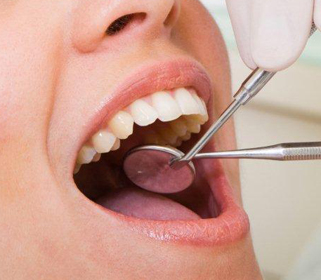Dental cleanings involve removing plaque (soft, sticky, bacteria infested film) and tartar (calculus) deposits that have built up on the teeth over time. Your teeth are continually bathed in saliva which contains calcium and other substances which help strengthen and protect the teeth. While this is a good thing, it also means that we tend to get a build-up of calcium deposits on the teeth. This chalky substance will eventually build up over time. Usually it is tooth coloured and can easily be mistaken as part of the teeth, but it also can vary from brown to black in colour.
If the scale or calculus (tartar, as dentists like to call it) is allowed to accumulate on the teeth it will unfortunately provide the right conditions for bacteria to thrive next to the gums. The purpose of the cleaning and polishing is basically to leave the surfaces of the teeth clean and smooth so that bacteria are unable to stick to them and you have a better chance of keeping the teeth clean during your regular home care.
How are dental cleanings done?
The dental hygienist or dentist uses specialized instruments for professional teeth cleaning and to gently remove these deposits without harming the teeth. The instruments which may be used during your cleaning, and what they feel like, are described below.
- Ultrasonic instrument: Commonly used first is an ultrasonic instrument which uses tickling vibrations to knock larger pieces of tartar loose. It also sprays a cooling mist of water while it works to wash away debris and keep the area at a proper temperature.
- Fine hand tools: Once the larger pieces of tartar are gone, the dentist will switch to finer hand tools (called scalers and curettes in dental-speak) to remove smaller deposits and smoothen the tooth surfaces. These tools are curved and shaped to match the curves of the teeth. They allow smaller tartar deposits to be removed by carefully scraping them off with a gentle to moderate amount of pressure.
- Polishing: Once all the surfaces are smooth, the dentist may polish your teeth. Polishing is done using a slow speed hand piece with a soft rubber cup that spins on the end. Prophylaxis (short for prophy) paste //? a special gritty toothpaste-like material is used on the teeth to make them shiny smooth.
- Fluoride: Your dentist hygienist may also apply fluoride. Fluoride foam or gel is then placed into small, flexible foam trays and placed over the teeth for 30 seconds. Afterwards the patient is directed to spit as much out as possible into a saliva ejector. The fluoride helps to strengthen the teeth since the acids from bacteria in dental tartar and plaque will have weakened the surfaces.
What is the outcome?
Good oral hygiene prevents, and is vital to the treatment of many of the dental and oral disorders. Good dental hygiene results in a healthy mouth. Moreover, the mouth is the gateway to the whole body. A healthy mouth ensures a healthy body to a great extent.
How frequently should scaling be done?
Plaque formation on the teeth is a continuous process. If this is not removed by brushing it starts mineralizing into tartar within 10-14 hours. Such persons may require periodic scaling and polishing, every 6 months or so. The golden rule is to have a routine dental check up every 6 months. Your dentist will be able to advise you whether you need scaling or not. He will also advise you on the correct home care for healthy teeth. It must be emphasized again that scaling of teeth does not weaken them but prevents gum diseases which bring about bleeding gums and if not checked leading to more serious and extensive gum problems.
Deep Teeth Cleaning Costs
The cost of a deep cleaning will be determined by the amount of plaque and tartar build up in someone’s mouth, as well as the overall condition of the teeth and gums. In the United States, a deep cleaning process may cost up to $400 per quadrant of the mouth. The mouth is divided into four quadrants, upper left and right, and lower left and right. The average cost for quadrant may range between $100 and $400. The cost of a deep cleaning for the entire mouth may cost a total of $1,600, sometimes more depending on individual patient scenarios.
However, international travellers benefit from large savings for deep cleaning dental procedures around the globe. Dental patients travelling to vacation destinations such as exotic Panama or Costa Rica often save between 30 and 50% on costs in the United States, and travellers to Asian destinations such as Thailand, Singapore and India may save up to 75% for the same procedure, while still enjoying the benefit of highly trained and experienced dental professionals.
















